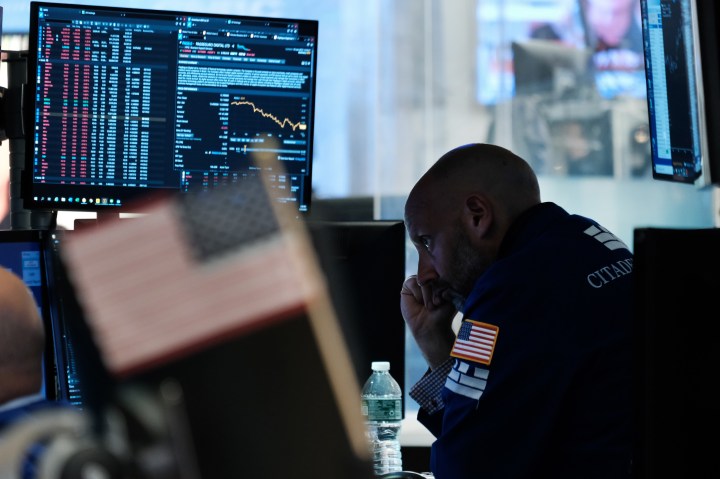
How do experts know the causes behind the stock market’s ups and downs?
Share Now on:
How do experts know the causes behind the stock market’s ups and downs?

This is just one of the stories from our “I’ve Always Wondered” series, where we tackle all of your questions about the world of business, no matter how big or small. Ever wondered if recycling is worth it? Or how store brands stack up against name brands? Check out more from the series here.
Listener Katy Davis asks:
When reporters say, “The markets are down today based on XX,” sometimes it is something really obvious like a recent jobs report or a surprising boost to the economy. But sometimes it is something that seems so vague, like “based on fears about the situation in Greece.” Anyway, how do they know that? Are they calling traders and asking? Guessing? How can an entire day of trading be summed up like that?
Sometimes the experts actually don’t know for sure. When asked how confident he is about his assessments, Commonwealth Financial Network’s chief investment officer, Brad McMillan, said:
“Not very. At the end of the day, this is an almost infinitely complex system.”
Some days, the drivers are more obvious than others, with news items like, yes, a recent jobs report. The Russia-Ukraine war. Or inflation numbers, like we saw Friday. The prices of consumer goods jumped 8.6% year over year in May, the highest rate since 1981. That showed inflation hasn’t slowed down, and it sent the Dow Jones Industrial Average plunging almost 900 points.
McMillan, who writes a Commonwealth blog, said you can draw a direct link between market movements and anything that “materially either changes or directly confirms expectations.”
But it can get complicated.
McMillan said he’ll look at various investment commentators’ second and third reactions to news that happened earlier in the week.
“For example, if the [Federal Reserve] raises rates, the initial reaction might well be, ‘Oh, my goodness, rates are higher. That’s bad for stocks,” he said.
But in the following days, the reaction might become: “If they raise rates, in the short term, that might increase the probability they’re gonna have to cut rates in the longer term. So on balance, that can be positive,” McMillan said.
There are multiple events happening at a given time, and McMillan has to parse which factors may be the most important. So right now, he’s paying attention to interest rates.
That’s because they strongly influence stock valuations. In recent blog post, McMillan explained:
“Lower rates mean higher valuations for stocks, which explains the market rally we saw during and after the pandemic, as rates were cut to zero and stocks soared. With rates rising again as the Fed tightens policy, we are seeing valuations adjust down, bringing down the market.”
There are also non-obvious factors that influence stocks, like the U.S. entering an election cycle. During years when there are midterms, McMillan said, the market performs worse.
And because it’s something we expect, it can actually become a “self-fulfilling prophecy, to some extent,” he explained.
Sometimes there are factors that led to market upswings or declines that analysts hadn’t accounted for at the time. For example, analysts tend to underestimate corporate earnings growth, McMillan said.
Back in 2015, global markets suffered amid fears of a possible Greek default on the nation’s debt. Vague, as listener Katy Davis pointed out. Investors and financial experts explained to news outlets at the time that investors don’t like political risk.
John Blank, the chief equity strategist at Zacks Investment Research, delved into that problem.
“Fears — of loss of capital — inside a country can be quantitatively expressed by other asset classes: by wider bond credit risk spreads, capital outflows that depreciate the domestic currency, higher lending rates, depressed activity. One would expect at least some of these to accompany a down stock market, in that case.”
Blank, who writes commentary for the firm, said analysts and experts can look at FinViz.com, a site that displays major stock indexes, stocks by market capitalization and “top gainers” or “top losers.”
Analysts can then tell how a specific sector, like health care, for instance, performed after an announcement from the government or another influential event, he explained.
Blank said sometimes it’s difficult to figure out what’s going on in the markets when there’s no obvious news that day, and an analyst might flag important upcoming news to help investors prepare.
There’s a lot happening in the world. Through it all, Marketplace is here for you.
You rely on Marketplace to break down the world’s events and tell you how it affects you in a fact-based, approachable way. We rely on your financial support to keep making that possible.
Your donation today powers the independent journalism that you rely on. For just $5/month, you can help sustain Marketplace so we can keep reporting on the things that matter to you.


















